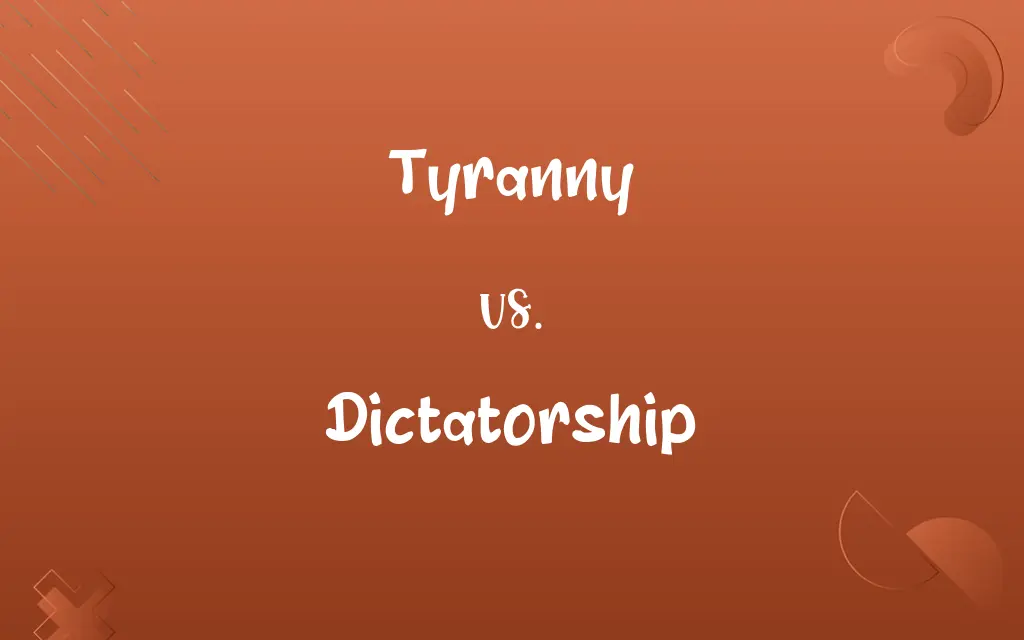Tyranny vs. Dictatorship: Know the Difference

By Shumaila Saeed || Published on February 19, 2024
Tyranny is oppressive rule marked by harsh and unjust practices, while a dictatorship is a form of government where a single individual holds absolute power.

Key Differences
Tyranny refers to a cruel and oppressive form of rule, often characterized by the arbitrary and unjust exercise of power. Dictatorship specifically denotes a system of government where absolute power is concentrated in the hands of a single ruler.
Shumaila Saeed
Feb 19, 2024
A tyrant can emerge in various forms of government and is primarily defined by their oppressive and unjust conduct. In contrast, a dictator is defined by their role as the sole ruler, regardless of whether their governance is benevolent or tyrannical.
Shumaila Saeed
Feb 19, 2024
Tyranny emphasizes the negative impact on the people, highlighting the suffering caused by despotic rule. Meanwhile, dictatorship focuses more on the structure of governance, signifying the concentration of power without implying inherent oppression.
Shumaila Saeed
Feb 19, 2024
Historically, tyranny has been used to describe rulers who abuse their power, regardless of their official title or government structure. Dictatorship, however, is a more modern term, often associated with autocratic rulers who control all aspects of the state.
Shumaila Saeed
Feb 19, 2024
In essence, tyranny is more about the nature of the rule and the ruler's behavior, while dictatorship is about the political structure that allows a single person to wield complete control.
Shumaila Saeed
Feb 19, 2024
ADVERTISEMENT
Comparison Chart
Definition
Oppressive and unjust rule.
Government by a single ruler with absolute power.
Shumaila Saeed
Feb 19, 2024
Focus
Cruelty and injustice in governance.
Concentration of political power.
Shumaila Saeed
Feb 19, 2024
Historical Usage
Used broadly for oppressive rulers.
More modern, linked to autocratic rule.
Shumaila Saeed
Feb 19, 2024
Implication
Describes the quality of rule.
Describes the structure of governance.
Shumaila Saeed
Feb 19, 2024
Requirement
Not tied to a specific form of government.
Requires a single, dominant leader.
Shumaila Saeed
Feb 19, 2024
ADVERTISEMENT
Tyranny and Dictatorship Definitions
Tyranny
Absolute power exercised cruelly and oppressively.
The people suffered under the tyranny of the cruel ruler.
Shumaila Saeed
Jan 14, 2024
Dictatorship
Governance without free and fair elections.
The dictator maintained power through rigged elections in the dictatorship.
Shumaila Saeed
Jan 14, 2024
Tyranny
A government or authority that is harsh and unfair.
The writer criticized the tyranny in her homeland.
Shumaila Saeed
Jan 14, 2024
Dictatorship
A form of government where a single person or party has absolute power.
The country transitioned into a dictatorship after the coup.
Shumaila Saeed
Jan 14, 2024
Tyranny
Rule characterized by arbitrary or despotic influence.
Citizens protested against the tyranny of the regime.
Shumaila Saeed
Jan 14, 2024
ADVERTISEMENT
Dictatorship
Rule by a dictator, often without democratic consent.
The dictatorship imposed strict censorship laws.
Shumaila Saeed
Jan 14, 2024
Tyranny
A state under cruel and oppressive governance.
The history book detailed the period of tyranny.
Shumaila Saeed
Jan 14, 2024
Dictatorship
A system where power is centralized in the hands of one ruler.
Under the dictatorship, opposition parties were banned.
Shumaila Saeed
Jan 14, 2024
Tyranny
An oppressive and dictatorial control.
The tyranny of the king led to widespread dissent.
Shumaila Saeed
Jan 14, 2024
Tyranny
Unjust or oppressive governmental power
"He tended to see the Crown as the benign center of the empire and Parliament as the malevolent source of tyranny" (Gordon S. Wood).
Shumaila Saeed
Jan 14, 2024
Tyranny
A government in which a single ruler is vested with absolute power
People liberated from a brutal tyranny.
Shumaila Saeed
Jan 14, 2024
Tyranny
The office, authority, or jurisdiction of an absolute ruler
Pisistratus held the tyranny of Athens.
Shumaila Saeed
Jan 14, 2024
Dictatorship
A type of government where absolute sovereignty is allotted to an individual or a small clique.
Shumaila Saeed
Jan 14, 2024
Dictatorship
Any household, institution, or other organization that is run under such sovereignty or autocracy.
Shumaila Saeed
Jan 14, 2024
Tyranny
An oppressive or harshly limiting condition
The tyranny of social expectations.
Shumaila Saeed
Jan 14, 2024
Dictatorship
The office, or the term of office, of a dictator; hence, absolute power.
Shumaila Saeed
Jan 14, 2024
Tyranny
A government in which a single ruler (a tyrant) has absolute power; this system of government.
Shumaila Saeed
Jan 14, 2024
Dictatorship
A form of government in which the ruler is an absolute dictator (not restricted by a constitution or laws or opposition etc.)
Shumaila Saeed
Jan 14, 2024
Dictatorship
State ruled by an individual with total control.
The documentary explored life under the dictatorship.
Shumaila Saeed
Jan 14, 2024
Tyranny
A system of government in which power is exercised on behalf of the ruler or ruling class, without regard to the wishes of the governed.
Shumaila Saeed
Jan 14, 2024
Tyranny
The government or authority of a tyrant; a country governed by an absolute ruler; hence, arbitrary or despotic exercise of power; exercise of power over subjects and others with a rigor not authorized by law or justice, or not requisite for the purposes of government.
"Sir," would he [Seneca] say, "an emperor mote needBe virtuous and hate tyranny."
Shumaila Saeed
Jan 14, 2024
Tyranny
Severity; rigor; inclemency.
The tyranny of the open night's too roughFor nature to endure.
Shumaila Saeed
Jan 14, 2024
Tyranny
A form of government in which the ruler is an absolute dictator (not restricted by a constitution or laws or opposition etc.)
Shumaila Saeed
Jan 14, 2024
Repeatedly Asked Queries
Is tyranny always associated with physical violence?
While physical violence can be a feature of tyranny, it's more broadly defined by oppressive and unjust rule, which can include psychological and economic oppression.
Shumaila Saeed
Feb 19, 2024
Are all tyrants also dictators?
Not all tyrants are dictators; a tyrant can exist in various forms of government and is defined by their oppressive actions rather than their official title.
Shumaila Saeed
Feb 19, 2024
Do dictatorships have a legal framework?
Dictatorships may have a legal framework, but it's often manipulated to suit the dictator's needs and to maintain their power.
Shumaila Saeed
Feb 19, 2024
Can a dictatorship be benevolent?
In theory, a dictatorship can be benevolent if the dictator prioritizes the welfare of the people, but in practice, dictatorships often become oppressive.
Shumaila Saeed
Feb 19, 2024
Can a dictator come to power through elections?
Yes, some dictators initially come to power through elections but then manipulate the system to consolidate absolute power.
Shumaila Saeed
Feb 19, 2024
Can a tyranny exist in a monarchy?
Yes, a monarchy can become tyrannical if the monarch rules oppressively and unjustly.
Shumaila Saeed
Feb 19, 2024
Can a democratic country become a tyranny?
Yes, if democratic institutions and checks and balances fail, a democratic country can slide into tyranny.
Shumaila Saeed
Feb 19, 2024
Do tyrants face international opposition?
Tyrants often face international condemnation, especially from democratic nations and human rights organizations.
Shumaila Saeed
Feb 19, 2024
Is tyranny only a political term?
While primarily political, tyranny can also describe any situation where power is used oppressively and unjustly, such as in familial or workplace contexts.
Shumaila Saeed
Feb 19, 2024
Is there a legal process to remove a dictator?
Legally removing a dictator is challenging, as they often control the legal system. Change usually requires political pressure, internal dissent, or external intervention.
Shumaila Saeed
Feb 19, 2024
Are tyrannies always totalitarian?
Tyrannies often exhibit totalitarian features, but they do not necessarily control every aspect of life and society as in a totalitarian system.
Shumaila Saeed
Feb 19, 2024
How do dictatorships maintain control?
Dictatorships often maintain control through censorship, propaganda, suppression of dissent, and sometimes, force.
Shumaila Saeed
Feb 19, 2024
How do citizens live under a dictatorship?
Life under a dictatorship can be restrictive, with limited freedoms and constant monitoring by the state.
Shumaila Saeed
Feb 19, 2024
Can international bodies intervene in a dictatorship?
International bodies like the United Nations can intervene, usually through sanctions or diplomatic pressure, but direct intervention is complex and depends on various factors.
Shumaila Saeed
Feb 19, 2024
Does tyranny affect economic policies?
Yes, tyranny often affects economic policies, sometimes leading to economic hardship due to the ruler's self-serving or mismanaged policies.
Shumaila Saeed
Feb 19, 2024
Are dictatorships stable forms of government?
Dictatorships can be stable in the short term but are often unstable in the long term due to the lack of legitimate succession mechanisms and widespread discontent.
Shumaila Saeed
Feb 19, 2024
Can tyranny be challenged legally?
Challenging tyranny legally is difficult, as tyrannical regimes often control the legal system, but it's not impossible, especially with international support.
Shumaila Saeed
Feb 19, 2024
Are all dictatorships militaristic?
Not all dictatorships are militaristic, but many rely on military support to maintain power.
Shumaila Saeed
Feb 19, 2024
Do tyrannies have opposition parties?
While opposition parties may exist in tyrannies, they are often suppressed, and their power and influence are limited.
Shumaila Saeed
Feb 19, 2024
How do dictatorships impact culture and media?
Dictatorships often control and censor media and cultural expressions to maintain their narrative and suppress dissenting voices.
Shumaila Saeed
Feb 19, 2024
Share this page
Link for your blog / website
HTML
Link to share via messenger
About Author
Written by
Shumaila SaeedShumaila Saeed, an expert content creator with 6 years of experience, specializes in distilling complex topics into easily digestible comparisons, shining a light on the nuances that both inform and educate readers with clarity and accuracy.








































































